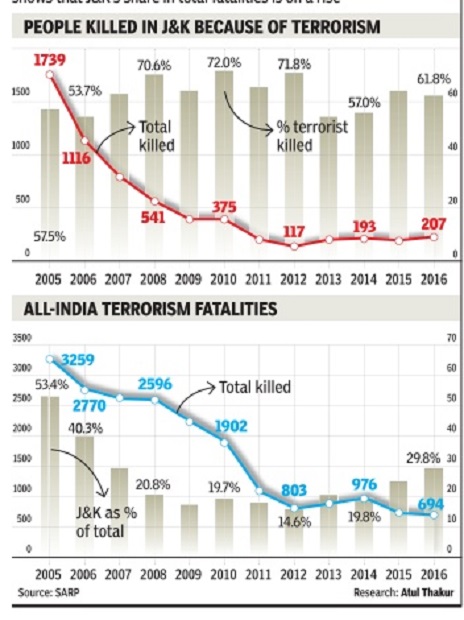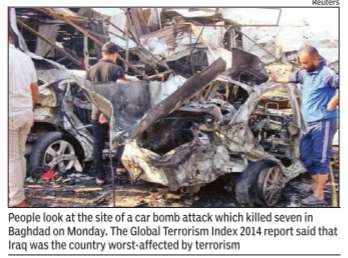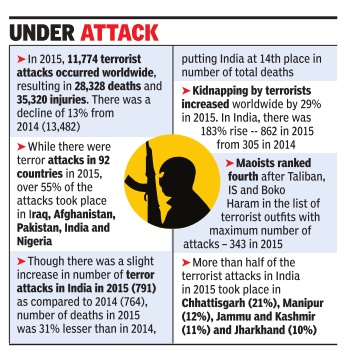Terrorism in India
(→Fatalities Related to Terror) |
(→Fatalities Related to Terror) |
||
| Line 41: | Line 41: | ||
'''See graphic''' | '''See graphic''' | ||
| + | |||
| + | =Terror suspects later acquitted/ discharged= | ||
| + | ==Some representative cases== | ||
| + | [http://epaperbeta.timesofindia.com//Article.aspx?eid=31808&articlexml=Wasted-Years-Is-This-Justice-18022017011019 Mateen Hafeez, Ashish Chauhan and Sarfaraz Shaikh, Accused In Terror Cases Spend Years In Jail, Only To Be Set Free By Courts Later, Feb 18 2017: The Times of India] | ||
| + | |||
| + | |||
| + | The story of Mohd Hussain Fazli and Mohd Rafiq Shah, the terror accused acquitted in the 2005 Delhi blasts after losing precious years in jail, resonates with several families across India. The aquittals of several terror suspects after years-long incarceration have time and again raised questions about the investigation carried out by various agencies. | ||
| + | |||
| + | In Maharashtra alone, for example, over 30 terror suspects have been either acquitted or discharged since 2004.“It's difficult to live with the same dignity in society once police label you a terror suspect,“ said Abdul Wahid Shaikh, a 711 suspect acquitted in 2015. Sheikh's son was two years and daughter six months old when he was arrested. “One cannot understand the trauma I went through. We were humiliated, beaten up and tortured during interrogation,“ he said. | ||
| + | |||
| + | “The state government has no system of rehabilitation. It's easy for people to say things get normal after acquittal. That's not true. I got my teaching job back but ev eryone is not that lucky. Most of those acquitted face financial problems when they want to start a new life,“ said Shaikh, who was accused of harbouring the Pakistanis who bombed the trains. | ||
| + | |||
| + | Hanif Sheikh, who came out of jail on February 2 after 13 years following his acquittal in the Ahmedabad tiffin blasts case, said he had no clue how to start life afresh. “In 2007, my mother died of shock with a prayer on her lips to see me out of jail. My wife, bedridden with depression since my arrest, succumbed a year later. My elder sister, who struggled to rear my children and fight my legal battle, died in 2009.My eldest daughter, a bright student, was forced to drop out due to non-payment of her school fees. There is no justice in pronouncing me innocent as the system has wronged me and my family ,“ he said.Sheikh used to run a garments business but it is all lost now. | ||
| + | |||
| + | Adam Ajmeri (54), who was facing the gallows until the SC acquitted him in the Akshardham attack case in 2014, said his friends and relatives turned their backs on him despite the clean chit. He could start life afresh only after two research scholars from National Law University collected Rs 7 lakh for him through crowd-funding. “No one would give me a job. My wife and six children were forced to survive on alms. I had turned suicidal when Allah sent the two good men who gave me Rs 7 lakh to start my dairy business,“ he said. | ||
=World ranking= | =World ranking= | ||
Revision as of 21:16, 13 March 2017
This is a collection of articles archived for the excellence of their content. |
Contents |
Cities with a high risk of terror
2014: Imphal, Srinagar
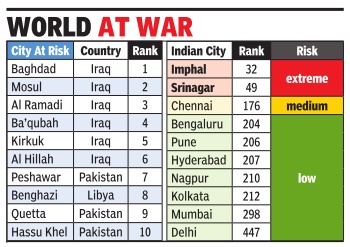
May 22 2015
2 Indian cities at high risk of terror strike
Kounteya Sinha
Two Indian cities -Imphal (ranked 32) and Srinagar (ranked 49) have been named to be at “extreme risk“ of a terrorist attack, mainly aiming to cause mass casualty and destroy public transport networks. According to an analysis of the terror risk to 1,300 commercial hubs and urban centres around the world, populations and businesses in 113 Indian cities have been identified to be at some risk -high, medium or low -of facing terrorist attacks.
The next major Indian city that faces a terrorist threat is Chennai with its risk quotient marked as medium. Bangalore is fourth among Indian cities, even though it is placed at 204th globally , followed by Pune and Hyderabad at 206th and 207th, respectively.
Around 64 cities around the world are at “extreme“ risk, with most in the Middle East and Asia, and three in Europe. While London ranked as low as at 400 due to the lack of a terror incident since the 77 bombings, Paris soared into the top 100 following the Charlie Hebdo shooting, according to Verisk Maplecroft's new Global Alerts Dashboard.
Speaking to TOI, Arvind Ramakrishnan, head of Maplecroft India said, “When it comes to Imphal and Srinagar, terrorist attacks aren't on commercial targets as much as against the security forces.Public transport networks in India are also prime targets“.
Fatalities Related to Terror
2005-16, i) J&K; ii) All India
2016 TERROR-RELATED FATALITIES IN J&K REACH 5-YEAR HIGH Oct 12 2016 : The Times of India
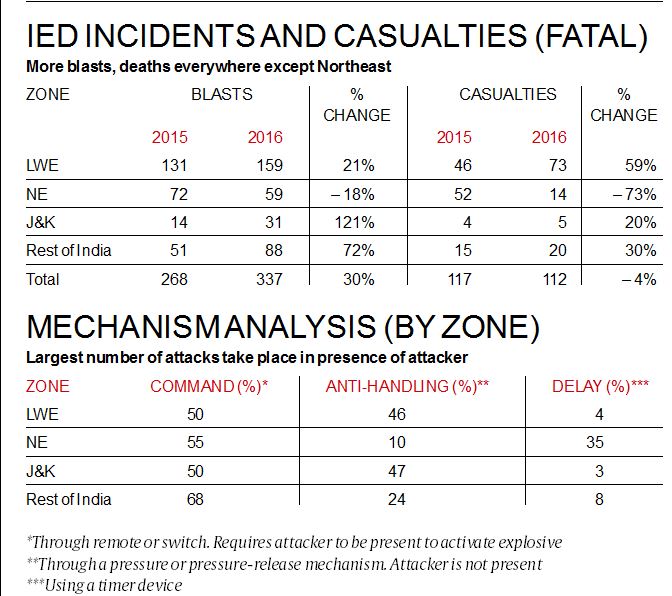
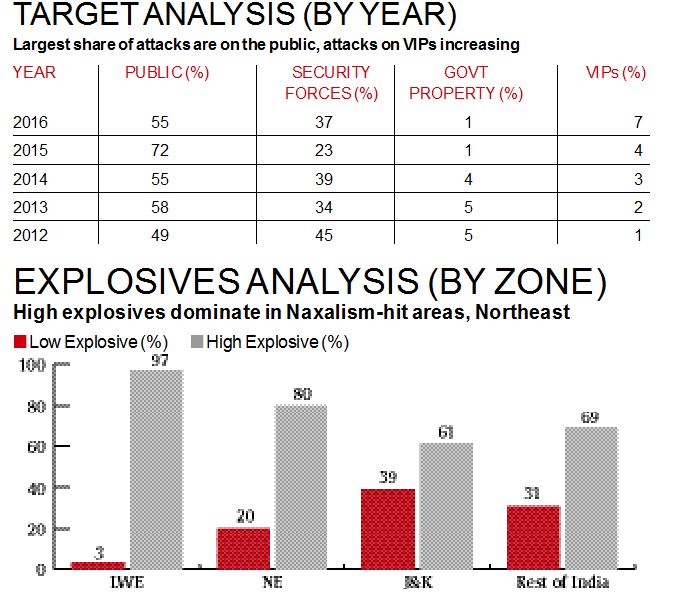
The total fatalities (civilians, security forces and terrorists) linked to terror incidents in Jammu & Kashmir is 207 for the period between January and Oct 2016--highest since 2010. The comparison of terror fatalities in Jammu & Kashmir with the rest of the country also shows that J&K's share in total fatalities is on a rise
See graphic
Terror suspects later acquitted/ discharged
Some representative cases
The story of Mohd Hussain Fazli and Mohd Rafiq Shah, the terror accused acquitted in the 2005 Delhi blasts after losing precious years in jail, resonates with several families across India. The aquittals of several terror suspects after years-long incarceration have time and again raised questions about the investigation carried out by various agencies.
In Maharashtra alone, for example, over 30 terror suspects have been either acquitted or discharged since 2004.“It's difficult to live with the same dignity in society once police label you a terror suspect,“ said Abdul Wahid Shaikh, a 711 suspect acquitted in 2015. Sheikh's son was two years and daughter six months old when he was arrested. “One cannot understand the trauma I went through. We were humiliated, beaten up and tortured during interrogation,“ he said.
“The state government has no system of rehabilitation. It's easy for people to say things get normal after acquittal. That's not true. I got my teaching job back but ev eryone is not that lucky. Most of those acquitted face financial problems when they want to start a new life,“ said Shaikh, who was accused of harbouring the Pakistanis who bombed the trains.
Hanif Sheikh, who came out of jail on February 2 after 13 years following his acquittal in the Ahmedabad tiffin blasts case, said he had no clue how to start life afresh. “In 2007, my mother died of shock with a prayer on her lips to see me out of jail. My wife, bedridden with depression since my arrest, succumbed a year later. My elder sister, who struggled to rear my children and fight my legal battle, died in 2009.My eldest daughter, a bright student, was forced to drop out due to non-payment of her school fees. There is no justice in pronouncing me innocent as the system has wronged me and my family ,“ he said.Sheikh used to run a garments business but it is all lost now.
Adam Ajmeri (54), who was facing the gallows until the SC acquitted him in the Akshardham attack case in 2014, said his friends and relatives turned their backs on him despite the clean chit. He could start life afresh only after two research scholars from National Law University collected Rs 7 lakh for him through crowd-funding. “No one would give me a job. My wife and six children were forced to survive on alms. I had turned suicidal when Allah sent the two good men who gave me Rs 7 lakh to start my dairy business,“ he said.
World ranking
2013: India 6th worst terror-hit country
Kounteya Sinha
Attacks Increased By 70% From 2012 To 2013, Toll Up From 238 To 404: India was the sixth worst-affected country by terrorism in 2013 -the other five being war zones at present. This came out in the Global Terrorism Index 2014 report which also said that the number of deaths from terrorism increased by 61% between 2012 and 2013.
There were nearly 10,000 terrorist attacks in 2013, a 44% increase from the previous year. But India witnessed a much higher increase of terrorist attacks during the same period -while terrorism increased by 70% in India from 2012 to 2013, the number of deaths increased from 238 to 404.
The report said that in India there remains significant terrorist activity including on the border between India and Pakistan. As many as 43 different terrorist groups were found to be operational in India and were categorized into three groups: Islamists, separatists and communists. They were found to have planned and carried out attacks.
Over 80% of the deaths from terrorist incidents in 2013 were recorded in just five countries: Iraq, Afghanistan, Pakistan, Nigeria and Syria. On a scale of one (low est impact of terrorism) to 10 (highest risk of terrorism) -Iraq which has emerged as the world's worst-affected country with terrorism is the only entry with a score of 10. India had a score of 7.86.
The largest year-on-year increase in deaths from terrorism was recorded between 2012 and 2013 increasing from 11,133 to 17,958. As many as 87 countries experienced a terrorist incident in 2013, slightly up from 81 in 2012. The number of countries experiencing over 50 deaths in one year hit an alltime high in 2013 at 24, five greater than the previous high of 19 countries in 2008.
About India, the Index said, “The number of attacks increased with 55 more attacks in 2013 than 2012. But the majority of terrorist attacks in India have low casualties. In 2013 around 70% of attacks were non-lethal.
“Communist terrorist groups are by far the most frequent perpetrators and the main cause of deaths in India. Three Maoist communist groups claimed responsibility for 192 deaths in 2013, which was nearly half of all deaths from terrorism in India.
“Police are overwhelmingly the biggest targets of Maoists, accounting for half of all deaths and injuries. This is mainly through armed assaults, which killed 85, and bombings and explosions, which killed 43,“ the report said.
The dispute with Pakistan over Jammu & Kashmir is the source of Islamic terrorism in India, according to the report. In 2013 three Islamist groups were responsible for around 15% of deaths in India. This includes Hizbul Mujahideen which was the only group in India to use suicide tactics in 2013.
“Islamist groups in India commonly use armed assaults targeting the police or bombings targeting private citizens. The majority of attacks occur in Hyderabad and Jammu & Kashmir,“ the report said.
Globally, four terrorist groups -al-Qaida, Boko Haram, ISIS and the Taliban were responsible for 66% of all deaths from terrorist attacks in 2013 in which the perpetrator was known.
2015: CPI (Maoist) world’s fourth deadliest terror outfit
The world witnessed 11,774 terror attacks in 2015, in which 28,328 people were killed and 35,320 injured. India was the fourth worst-affected country after Iraq, Afghanistan and Pakistan, with 43% of 791 attacks in the country carried out by Naxalites. A total of 289 Indians died in terror strikes.
Data collected by the National Consortium for the Study of Terrorism and Responses to Terrorism cont racted with the US state department revealed that Taliban, Islamic State and Boko Haram were the three deadliest terror groups globally. They were followed by CPI (Maoist), a banned outfit. The CPI(Maoist) was responsible for 343 terror attacks in 2015, killing 176 people. Taliban were involved in 1,093 strikes in which 4,512 people lost their lives, IS launched 931 attacks which claimed the lives of 6,050 people and Boko Haram was involved in 491 attacks killing 5,450 people. Kurdistan Workers' Party (PKK), which rounded off the top five in the list, was involved in 238 strikes, killing 287.
Over half the terror at tacks in India took place in four states -Chhattisgarh (21%), Manipur (12%), J&K (11%) and Jharkhand (10%).Chhattisgarh, which has been hit hard by Left-wing extremism, reported a doubling of terror attacks in 2015 -from 76 in 2014 to 167. The report said there was great diversity in the perpetratorsterrorist groups involved in attacks in the country , with 45 outfits ac tive across the country . The Naxals alone accounted for 43% of terrorist attacks in India last year. The report said the number of people kid nappedtaken hostage by terrorists and insurgent groups in India almost tripled in 2015, increasing to 862 from 305 in 2014. Of this, Naxals alone kid nappedtook hostage 707 persons last year compared with 163 in 2014. In 2014, there were no attacks in which 50 or more people were kidnapped or taken hostage while in 2015, there were seven such attacks, all of them attributed to Maoists.
Home ministry data also said that between 2010 and 2015, 2,162 civilians and 802 security personnel were killed by Naxals. Most of the dead were `tribals', often branded as police informers.
The report said that while India ranked high among countries witnessing terror attacks, the lethality of these attacks were relatively low.The number of perpetrators terrorists killed in attacks in India doubled in 2015, accounting for 20% of all deaths compared with 7% in 2014. In all, 6,924 terrorists (24%) were killed in the attacks perpetrated by them worldwide. The use of bombsexplosions as tactic for attacks was less prevalent in India than worldwide.
